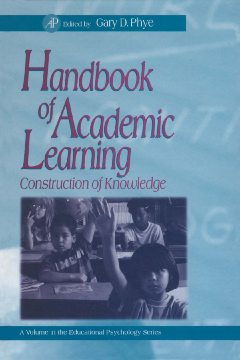
Additional Information
Book Details
Abstract
The Handbook of Academic Learning provides a comprehensive resource for educational and cognitive psychologists, as well as educators themselves, on the mechanisms and processes of academic learning. Beginning with general themes that cross subject and age level, the book discusses what motivates students to learn and how knowledge can be made personal for better learning and remembering. Individual chapters identify proven effective teaching methods for the specific domains of math, reading, writing, science, and critical problem solving, how students learn within those domains, and how learning can be accurately assessed for given domains and age levels.
The Handbook takes a constructivist perspective to academic learning, emphasizing the construction of personal knowledge of an academic nature. Constructivism within the context of learning theory is viewed as involving an active learner that constructs an academic knowledge base through the development of cognitive strategies and metacognition. The book discusses the development of basic literacy skills that provide the foundation for higher order thinking and problem solving. Constructivism recognizes the social dimension of classroom learning and emphasizes the motivational elements of self-regulation and volition as essential learner characteristics.
Written by authors who have first-hand experience with both theory development and the development of authentic classroom instructional techniques, the Handbook empowers educators to develop, implement, and field-test authentic instructional practices at their school site. The book provides a review of the literature, theory, research, and skill techniques for effective teaching and learning.
Key Features
* Identifies effective teaching with specific techniques
* Covers elementary school through high school
* Discusses teaching methods for all main subject areas: reading, writing, math, science, and critical thinking
* Identifies how students learn to learn
* Reviews theory, research, techniques, and assessment
* Contains field tested examples for the educational professional at the school site
* Provides a resource for staff development
"Phye has edited and contributed to a book that will be essential reading among those who study learning. More than explicating learning theories, as Gorden H. Bower and Ernest R. Hilgard's highly regarded Theories of Learning (1981) did for a generation of learning theory students, the contributors discuss the evolution of constructivist theories and explain their emergence and application."
--CHOICE
"The book Handbook of Academic Learning: Construction of Knowledge is an important contribution to an understanding of school learning and will provide a useful and comprehensive resource to a variety of professionals associated with academic learning. This volume provides an impressive overview of the kinds of practices that are currently emphasized in schools."
--CONTEMPORARY PSYCHOLOGY
